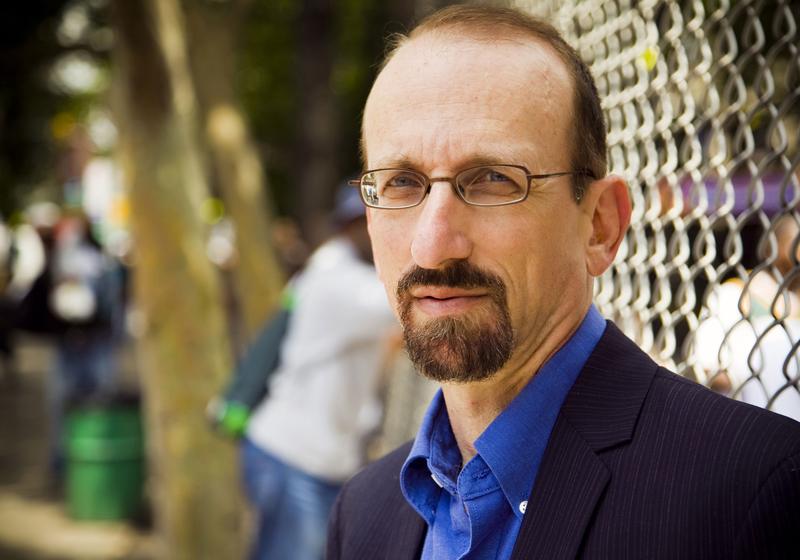BROOKE GLADSTONE: This is On the Media. I'm Brooke Gladstone, The day after the explosion, we hit a news lull, so many outlets filled their air with recycled video, speculation, sorrow on the scene, pundits, consultants and blather. Personally, I think ABC's Dancing with the Stars had the right approach.
[DWTS CLIP]:
TOM BERGERON: Our thoughts are with everyone in Boston tonight. I have family members and many friends there. My heart is with you. ABC News is monitoring the situation back there. They’ll keep you updated if we have any breaking stories.
BURKE CHARVET: Our entire cast is thinking about you and, as always, our show was planned in advance and hopefully we can still have an entertaining night of competition for you.
BROOKE GLADSTONE: I found that tasteful, but then I don’t have a daily two-hour call-in show. So on Thursday I asked the best call-in host I know, WNYC's Brian Lehrer, how he determined how much was enough and how much was too much. He said that on the morning after, even though there was no news to report, to say nothing was impossible.
BRIAN LEHRER: The absence itself is a canyon-sized void in a situation like that. Something so momentous just happened. Someone blew up the Boston Marathon, and we don't know who and we really want to know who, and we think any minute they might tell us who, so we listen. What you do if your neighbor's been shot dead? You gather ‘round with your other neighbors and you talk about the victims and you speculate about the perps, and you tsk-tsk about what the world is coming to. I mean, that’s just normal, and I think it's even good to want that, certainly from a talk show like I host, and even from a news program.
BROOKE GLADSTONE: You said something that just pushed a hot button with me, “speculating about the perps.” This is something that all news was doing everywhere. It struck many listeners, and probably you too, that this is a very uncomfortable situation to be in.
BRIAN LEHRER: There is a point where I think it becomes a kind of terrorism porn. It happened visually after 9/11, the attack itself shown on TV over and over again. I think there was some of that with the video of the second explosion in Boston and that one old runner falling down. But I don’t blame the viewers. The networks are trying to hook us and they feast on our state of shock. And I think in the talk show realm, there's a kind of terrorism porn too. I heard one commercial show where the host was literally putting it out there: Who do you think did it? People are just gonna draw on their biases at that point.
BROOKE GLADSTONE: But aren’t you being a little inconsistent here because you're saying people want to come together in a community and, and speculate and you're saying that they shouldn't?
BRIAN LEHRER: I agree that I'm being inconsistent, and I think there’s a line somewhere that's more art than science. And to some degree, you gotta get it out, you gotta let it out. But I personally would never frame a conversation simply around “who do you think did it,” as opposed to some speculation being allowed in, in kind of a larger conversation.
BROOKE GLADSTONE: Did any listener call up and say, hey, all this other stuff has been happening in the news, why don’t we talk about that?
BRIAN LEHRER: That happened. We didn’t take those calls on the air but there will always be those calls. Somebody called in to say, why don’t you talk about the people who died in a bombing in Iraq today? And fair point. But you have to make a judgment as to what's gonna be the most relevant and the most meaningful to people in the audience at a special and intense moment like that, and then make sure you don't do it all day, every day. That's when cable news really becomes junk, when they take those intense moments that are special and try to turn them into a format that they can do 27/365.
BROOKE GLADSTONE: So how did you deal with it?
BRIAN LEHRER: On Tuesday, being on 10 am to noon Eastern, we realized as we were starting the show that nothing was changing, but still we spent half the show on it at that time. And it was that combination of analyzing what was known, of taking calls for people's thoughts and feelings. My sense was that people really wanted to be in touch. Within the first 24 hours, people were still ahh! And if we started talking only about other things, people would've gone looking for it. So that was for Tuesday. Wednesday and Thursday we didn't mention it.
BROOKE GLADSTONE: We spoke to WNYC's Brian Lehrer on Thursday. On Friday, his show did start with the latest updates on the overnight shootout and the ongoing manhunt, but he also talked about the Immigration Bill, New York City school testing and North Korea.

